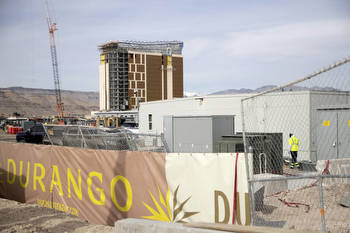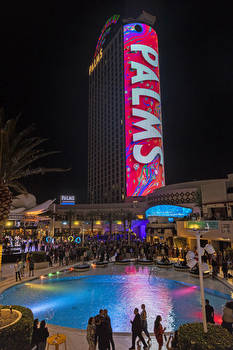REITs Lead Charge to Consolidate Casino Real Estate

The need for growth capital is driving gaming companies into net lease deals.
The slowdown in transactions across commercial real estate as a result of higher interest rates is unlikely to dramatically change in the near term as the question of value continues to plague buyers, sellers and lenders. But properties that house gaming operators are proving the exception.
Not only did casino tenants pay rent when closed during the lockdown, but gaming traffic rapidly rebounded upon reopening and continues to build. Visitor volume in Las Vegas grew nearly 5 percent in November to nearly 3.3 million vs. the prior year, for example, and along the Strip, revenue per available room (RevPAR) surged 27 percent to more than $167 over the same period, according to the Las Vegas Convention and Visitors Authority.
Against this backdrop, the two most prominent net-lease investors in gaming real estate– Gaming & Leisure Properties and VICI Properties, both REITs– maintained their steady pace of acquisitions throughout 2022. The activity was part of a trend in which gambling operators executed sale-leasebacks to raise growth capital. In fact, gaming REIT analysts contend, the volatile credit markets have made the REITs a compelling financing vehicle and are furthering a consolidation of casinos real estate that started a decade ago.
Since being spun out of PENN National Gaming (now PENN Entertainment) in 2013, GLP has amassed some 57 primarily regional casino properties in 17 states. VICI Properties, which was spun out of Caesars Entertainment in 2017, has built a portfolio of 45 gaming destinations across 15 states, with a significant concentration in Las Vegas. The metrics are also enticing new entrants. In February 2022, Realty Income executed a $1.7 billion sale-leaseback of Encore Boston Harbor with Wynn Resorts.
“Throughout the pandemic, we saw a number of material transactions taking place among the gaming REITs and operators,” said John DeCree, director of Global Gaming for CBRE. “We’re in a unique situation right now where, for the first time in their lifespan, the REITs can provide operators with pretty favorable financing terms and a more attractive cost of capital than the debt markets.”
Advantageous Funding
Indeed, because of rising interest rates, debt issued by some casino operators a year ago is trading at such a discount that an original coupon of 5.9 percent is now closer to 11 percent. As a result, if those companies sought similar debt financing today, their cost of capital would be around 11 percent, pointed out Ed Pitoniak, CEO of New York-based VICI Properties. By comparison, deep-pocketed gaming property REITs can buy properties at a capitalization rate that is a few hundred basis points below that and still capture a healthy spread to their cost of capital.
“As 2022 unfolded, it became clear that the credit markets were changing in a seismic way, and the trading value of existing debt deteriorated badly,” Pitoniak said. “If anybody wanted debt, it was very tough to come by.”
Among other transactions in 2022, VICI Properties completed its $17.2 billion purchase of MGM Growth Properties, which netted it eight regional gaming assets and seven Las Vegas resorts, including the Park MGM and a 50.1 percent interest in Mandalay Bay and MGM Grand. In December, the REIT announced that it would acquire the balance of the MGM Grand and Mandalay Bay from liquidity-challenged Blackstone Real Estate Income Trust for nearly $1.3 billion in cash and the assumption of debt. In January, Vici announced it was buying the real estate of four casinos in Alberta, Canada.
“I think there’s a great deal of synergy that has emerged in terms of the operating company-property company model for gaming assets,” said Anthony Paolone, an executive director and REIT analyst with JP Morgan. “The REITs are getting very compelling real estate investments and are also making it work for the operators, who are getting access to capital through very efficient transactions.”
Building Bridges
In addition to receiving healthy rental income and escalations, the sale-leaseback deals create relationships between the REITs and casino operators that can lead to future investments, he added. In August, for example, VICI Properties partnered with Century Casinos to buy the Rocky Gap Casino Resort in western Maryland. The REIT paid $204 million for the real estate and Century Casinos acquired the operations for $56 million.
Rather than solely pursuing sale-leasebacks, however, VICI Properties has accelerated its opportunistic real estate lending strategy, which provides financing to gaming and non-casino entertainment operators alike. The goal is to build a bridge to ownership or to fetch more attractive yields than possible through acquisition.
The REIT’s non-casino loan activity includes $266 million in mezzanine financing to Great Wolf Lodge, and more recently, an agreement to provide the Canyon Ranch spa brand with $200 million to develop a resort in Austin with a right to purchase the asset later. VICI Properties also has committed up to $300 million in mezzanine financing to complete the construction of the Fontainebleau Las Vegas, a casino resort development some 17 years in the making after stalling during the financial crisis.
“If you have to borrow money right now, you’re pretty sober about the market conditions and saying, ‘If that’s the cost of capital, that’s what I have to pay,’” Pitoniak explained. “But if you’re a seller, you may still be anchored to what you think the real estate was worth a year ago. We don’t want to waste a lot of time negotiating in those cases because it’s not reality in 2023.”
Growth Industry
GLP has been busy, too. The REIT recently paid $635 million for the real estate assets of Bally’s Tiverton Casino & Hotel in Rhode Island and Bally’s Hard Rock & Casino in Biloxi, Miss., where it executed a master lease with the operator for an initial term of 15 years. It also announced that it would provide up to $775 million to PENN Entertainment to fund the relocation of two riverboat casinos in Illinois and the potential construction of new casino hotel rooms in Columbus, Ohio, and in Henderson, Nevada.
During GLP’s third quarter earnings call in late October, executives noted that they were beginning to see more greenfield development proposals because of a slowing construction financing environment. All told, the institutionalization of gaming properties is only in the middle innings, observed Matthew Demchyk, GLP’s chief investment officer.
Plus, experts say, the investment opportunities continue to grow. The legalization of sports wagering outside of Las Vegas is bringing new customers to casinos, and new casino developments are taking place around the country. Some of the most anticipated projects could occur in downstate New York – including New York City – where the state is granting up to three casino licenses. Among those competing for those licenses are SL Green and Caesars Entertainment, which have teamed up to propose Caesars Palace Times Square, and Related Cos. and Wynn Resorts, which would add a casino to Hudson Yards.
“We’ve watched economic and structural headwinds significantly impact a number of property types that were long considered blue-chip holdings,” GLP’s Demchyk told analysts. “Pound for pound, regional gaming real estate continues to stand out as incredibly attractive compared with other investments across the real estate spectrum.”
Read the February 2023 issue of CPE.




































